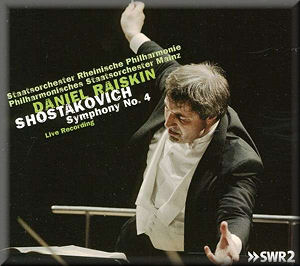 |
 |
| 

alternatively
CD: MDT
AmazonUK
AmazonUS
|
Dmitri SHOSTAKOVICH
(1906-1975)
Symphony No. 4 in C minor, Op. 43 (1936) [65:30]
 Staatsorchester Rheinische Philharmonie, Philharmonisches Staatsorchester
Mainz/Daniel Raiskin
Staatsorchester Rheinische Philharmonie, Philharmonisches Staatsorchester
Mainz/Daniel Raiskin
rec. live, 19-20 March 2009, Phönix-Halle, Mainz (SWR), Rhein-Mosel-Halle,
Koblenz (Deutschlandradio Kultur)
 C-AVI 8553235 [65:30]
C-AVI 8553235 [65:30] 
|
|
|
An early performer likened the effect of Shostakovich’s opera
The Nose to ‘an anarchist’s grenade’, a description that
could just as easily be applied to the Fourth Symphony, written
eight years later. The latter’s a hugely talented piece and
the seedbed for much that was to take hold and germinate in
the composer’s later works. But it’s more than that; in the
right hands it’s Shostakovich’s most uncompromising and subversive
symphony. Remember, the finale of the Fourth was completed in
the immediate aftermath of Stalin’s infamous Pravda article,
with all the personal and artistic turmoil that brought with
it.
Among the most penetrating versions of this symphony on CD are
Kiril Kondrashin’s on Melodiya, Gennadi Rozhdestvensky’s Czech
radio broadcast from 1985, Neeme Järvi’s for Chandos and,
most recently, Mark Wigglesworth’s for BIS. There’s some dispute
about the exact provenance of the Rozhdestvensky, but absolutely
no doubt about his excoriating performance. Hard to beat, I
thought, until Wigglesworth burst on the scene. In many ways
this was the Fourth I’d been waiting for, combining as it does
the visceral elements of Rozhdestvensky and Kondrashin with
an implacable strength and clarity of vision that’s just astounding
(review).
Indeed, it was one of my picks for 2010, and a reading I was
sure could not be improved upon.
Enter Daniel Raiskin, the up-and-coming maestro from St. Petersburg
and, since 2005, the chief conductor of the Staatsorchester
Rheinische Philharmonie. Lest one is tempted to write off these
provincial bands, remember Wigglesworth’s Dutch radio orchestra
play Shostakovich as if to the manner born. Factor in a top-notch
hybrid recording from BIS and you’ll understand why these newcomers
elicited polite interest rather than outright enthusiasm when
the disc was offered for review.
Well, seconds into the Allegretto and any such doubts are thrust
aside by the most lacerating introduction to this symphony I’ve
ever encountered. The shrieking strings, chatter of woodwinds
and bone-crushing contributions from the percussionists simply
beggars belief. It’s not just about heft, for the alarums and
excursions that ensue are every bit as gripping, Raiskin extorting
exceptional, razor-sharp attack from his players. Wigglesworth
is broader and there’s much more air around the notes, but the
Russian’s reading – and Avi’s close recording – are alive with
detail and arcing with unrelieved electricity.
Shostakovich’s strange ditties and diversions are all uncovered
with forensic skill, the orchestra responding to this wild music
with remarkable assurance. Raiskin never allows the pace to
flag and the climaxes – judiciously scaled – are staggering
in both breadth and intensity. As for those Mahlerian crescendi,
they’ve seldom sounded so menacing, the timps so brutal. One
really is in the front row of the stalls here, and there’s no
escape from the withering fire. Even Shostakovich’s more spectral
writing is as revealing as an x-ray image, the yearning strings
most beautifully caught. But it’s Raiskin’s strong, steady pulse
that holds all these disparate elements together, the music
utterly compelling throughout.
And how winningly he phrases the opening of the Moderato. That
said, Raiskin brings something of Bartók’s nervous energy –
and colour - to the score. There’s a pleasing sense of proportion
as well, all those sardonic asides voiced with as much care
and attention as the symphony’s more spectacular outbursts.
No apologies need be made for the fact that this is a live recording,
made over two nights and in different venues; detail is abundant,
perspectives are consistent, and the audiences are very quiet
indeed.
The Largo – Allegro has a pronounced Mahlerian cast, the opening
cortege played with splendid character and weight. It’s those
gaunt little tunes that bubble up and then subside that give
this movement its abiding strangeness, that first peroration
as anguished as I’ve ever heard it. This really is a Lubyanka-like
edifice of dread and despair, as dark as anything Shostakovich
ever wrote, and Raiskin wrings the most individual sonorities
from his players. Not only that, he builds tension like few
others, that crazed march underpinned by the truly explosive
thud of timps and crowned with fevered brass.
In a work littered with frigid interludes this movement has
more than its fair share of chill-inducing moments, with Shostakovich
passing uneasily between cold terror and grim comedy. As for
that lampooning brass, it’s superbly managed, the Mahlerian
scurry beneath it deftly done. And all the while Raiskin maintains
a mesmeric tension, so that when that cataclysm finally arrives
it’s been well prepared. Goodness, this is a scream like no
other in the symphonic repertoire, the Avi engineers drawing
out every last, incandescent detail and decibel. But it’s the
haunted postlude that’s really terrifying; this is truly a blasted
heath, a no-man’s land of unimaginable bleakness. As compelling
as Wigglesworth is at this point, Raiskin distils something
quite extraordinary from the notes. The ghostly shimmer of the
celesta is indescribably moving.
Having emptied the cupboard of superlatives, all I can say is
that Daniel Raiskin is a man to watch. Like that anarchist’s
ordnance, he’s blown away every shred of smugness and complacency
I felt before hearing this phenomenal performance.
Shattering, unforgettable Shostakovich.
Dan Morgan
|
|















